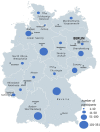Experiencing COVID-19, home isolation and primary health care: A mixed-methods study
- PMID: 36703817
- PMCID: PMC9872200
- DOI: 10.3389/fpubh.2022.1023431
Experiencing COVID-19, home isolation and primary health care: A mixed-methods study
Abstract
Objectives: Although the vast majority of COVID-19 cases are treated in primary care, patients' experiences during home isolation have been little studied. This study aimed to explore the experiences of patients with acute COVID-19 and to identify challenges after the initial adaptation of the German health system to the pandemic (after first infection wave from February to June 2020).
Methods: A mixed-method convergent design was used to gain a holistic insight into patients experience. The study consisted of a cross-sectional survey, open survey answers and semi-structured telephone interviews. Descriptive analysis was performed on quantitative survey answers. Between group differences were calculated to explore changes after the first infection wave. Qualitative thematic analysis was conducted on open survey answers and interviews. The results were then compared within a triangulation protocol.
Results: A total of 1100 participants from all German states were recruited by 145 general practitioners from August 2020 to April 2021, 42 additionally took part in qualitative interviews. Disease onset varied from February 2020 to April 2021. After the first infection wave, more participants were tested positive during the acute disease (88.8%; 95.2%; P < 0.001). Waiting times for tests (mean 4.5 days, SD 4.1; 2.7days, SD 2.6, P < 0.001) and test results (mean 2.4 days, SD 1.9; 1.8 days, SD 1.3, P < 0.001) decreased. Qualitative results indicated that the availability of repeated testing and antigen tests reduced insecurities, transmission and related guilt. Although personal consultations at general practices increased (6.8%; 15.5%, P < 0.001), telephone consultation remained the main mode of consultation (78.5%) and video remained insignificant (1.9%). The course of disease, the living situation and social surroundings during isolation, access to health care, personal resilience, spirituality and feelings of guilt and worries emerged as themes influencing the illness experience. Challenges were contact management and adequate provision of care during home isolation. A constant contact person within the health system helped against feelings of care deprivation, uncertainty and fear.
Conclusions: Our study highlights that home isolation of individuals with COVID-19 requires a holistic approach that considers all aspects of patient care and effective coordination between different care providers.
Keywords: COVID-19; Germany; general practice; home isolation; illness experience; mixed methods; patients' experience; telehealth.
Copyright © 2023 Parisi, Lehner, Schrader, Kierer, Fleischer, Miljukov, Borgulya, Rüter, Viniol and Gágyor.
Conflict of interest statement
The authors declare that the research was conducted in the absence of any commercial or financial relationships that could be construed as a potential conflict of interest.
Figures
Similar articles
-
Primary care professionals' experiences during the first wave of the COVID-19 pandemic in Greece: a qualitative study.BMC Fam Pract. 2021 Sep 3;22(1):174. doi: 10.1186/s12875-021-01522-9. BMC Fam Pract. 2021. PMID: 34474684 Free PMC article.
-
"At Home, with Care": Lessons from New York City Home-based Primary Care Practices Managing COVID-19.J Am Geriatr Soc. 2021 Feb;69(2):300-306. doi: 10.1111/jgs.16952. Epub 2020 Nov 20. J Am Geriatr Soc. 2021. PMID: 33179761 Free PMC article.
-
Use of alternative consultation forms in Danish general practice in the initial phase of the COVID-19 pandemic - a qualitative study.BMC Fam Pract. 2021 Jun 2;22(1):108. doi: 10.1186/s12875-021-01468-y. BMC Fam Pract. 2021. PMID: 34078281 Free PMC article.
-
[Changes in the provision of primary care and psychotherapy in Germany during the first two lockdowns in 2020 and 2021: A two-wave survey giving consideration to gender identity and sexual orientation].Z Evid Fortbild Qual Gesundhwes. 2023 Apr;177:26-34. doi: 10.1016/j.zefq.2023.01.006. Epub 2023 Mar 22. Z Evid Fortbild Qual Gesundhwes. 2023. PMID: 36964120 Free PMC article. German.
-
Ensuring the continuation of routine primary care during the COVID-19 pandemic: a review of the international literature.Fam Pract. 2022 Jul 19;39(4):747-761. doi: 10.1093/fampra/cmab115. Fam Pract. 2022. PMID: 34611708 Free PMC article. Review.
Cited by
-
Exploring illness perceptions of multimorbidity among community-dwelling older adults: a mixed methods study.Aging Health Res. 2023 Dec;3(4):100158. doi: 10.1016/j.ahr.2023.100158. Epub 2023 Sep 16. Aging Health Res. 2023. PMID: 38779434 Free PMC article.
-
Procalcitonin to guide antibiotic use during the first wave of COVID-19 in English and Welsh hospitals: integration and triangulation of findings from quantitative and qualitative sources.BMJ Open. 2025 Aug 8;15(8):e093210. doi: 10.1136/bmjopen-2024-093210. BMJ Open. 2025. PMID: 40780726 Free PMC article.
-
How are countries responding differently to COVID-19: a systematic review of guidelines on isolation measures.Front Public Health. 2023 Aug 30;11:1190519. doi: 10.3389/fpubh.2023.1190519. eCollection 2023. Front Public Health. 2023. PMID: 37719732 Free PMC article.
-
Stress experiences of healthcare assistants in family practice at the onset of the COVID-19 pandemic: a mixed methods study.Front Public Health. 2023 Sep 4;11:1238144. doi: 10.3389/fpubh.2023.1238144. eCollection 2023. Front Public Health. 2023. PMID: 37732100 Free PMC article.
-
Factors associated with the worsening of COVID-19 symptoms among cohorts in community- or home-isolation care in southern Thailand.Front Public Health. 2024 Mar 20;12:1350304. doi: 10.3389/fpubh.2024.1350304. eCollection 2024. Front Public Health. 2024. PMID: 38572011 Free PMC article.
References
-
- World Health Organization . WHO COVID-19 Dashboard. Geneva: World Health Organization; (2020).
-
- Landsman JA, Verheij NP, Alma MA, van den Boogaard J, Luning-Koster M, Evenboer KE, et al. COVID-19: Recovering at Home is not Easy. Ned Tijdschr Geneeskd. (2020) 164:D5358. - PubMed
Publication types
MeSH terms
LinkOut - more resources
Full Text Sources
Medical
Miscellaneous




